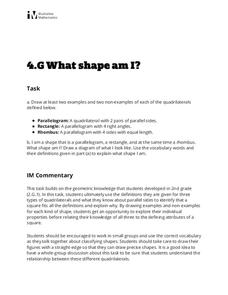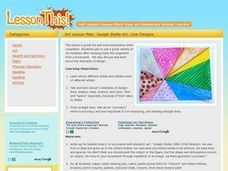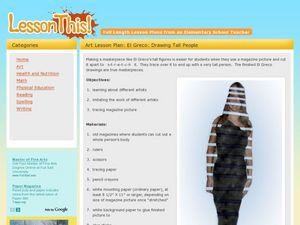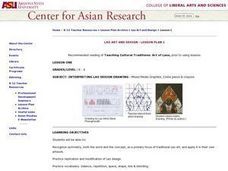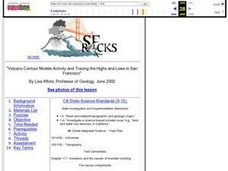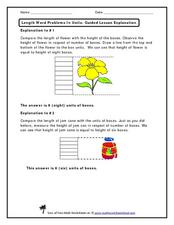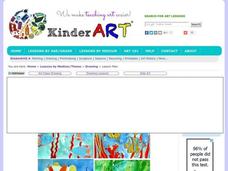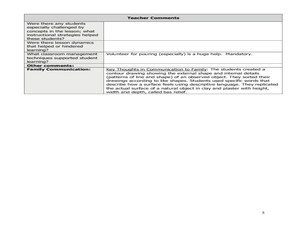Curated OER
Did You Know?
Learn about ants and printing in one fun activity! After you read some interesting facts about ants, practice writing the word ant on a tracing line. Then, draw a picture of an ant in a space provided.
Curated OER
Sailing Vessel Contour Creations
Students explore different types of sailing vessels and the rigging, sails, masts. They discuss contour lines and how they can be used to create a portrait of a sailing vessel then they choose a sailing vessel image as a reference to...
National Institute of Open Schooling
Atomic Structure
Learners explain historical findings such as Rutherford and Bohr's contributions, explain wave particle duality, and formulate Heinsenberg's uncertainty principle. They also draw s, p, and d orbitals, explain more historical findings,...
Mathematics Vision Project
Module 5: Modeling with Geometry
Solids come in many shapes and sizes. Using geometry, scholars create two-dimensional cross-sections of various three-dimensional objects. They develop the lesson further by finding the volume of solids. The module then shifts...
Illustrative Mathematics
What Shape Am I?
Sharpen your pencil and grab a ruler, it's time to draw some quadrilaterals! Given the definition of a parallelogram, rectangle, and rhombus, learners draw examples and nonexamples of each figure. The three definitions are...
Maryland Department of Education
The Concept of Diversity in World Literature Lesson 9: Debating Imperialism
To gain an understanding of Imperialism, class members read Rudyard Kipling's poem, "The White Man's Burden" and Mark Twain's essay, "To the Person Sitting in Darkness." Groups compare these perceptions of non-white cultures with the...
Charleston School District
Sketching a Piecewise Function
How do you combine linear and nonlinear functions? You piece them together! The lesson begins by analyzing given linear piecewise functions and then introduces nonlinear parts. Then the process is reversed to create graphs from given...
Computer Science Unplugged
Beat the Clock—Sorting Networks
Can multiple computers sort a list faster than one? Using a network drawn with chalk outside, groups move through the decision network to sort numbers. A series of extension questions come with the lesson and can be used in the same...
Curated OER
Contour Hand Gestures with Text
Students examine different types of hand drawings. They create their own 3-D contour drawings. They also discuss the use of symbolism in art.
Curated OER
Joseph Stella Art: Line Designs
Students discover the focal point in pictures and create their own images using lines and space. In this art analysis lesson, students create a black dot on a white paper which becomes a focal point for the lines the student will...
Curated OER
Draw Johann Sebastian Bach
Learners sketch a portrait of Johann Sebastian Bach. In this portrait lesson, students discover the elements of drawing a face. Learners manipulate curved lines and shading to create an original piece of art.
Curated OER
Informed Drawing Through Observation
Learners practice observation techniques to improve their drawing skills. In this drawing technique instructional activity, students assess drawing as an art media and discuss realism. Learners view examples of animal drawings and...
Curated OER
Descriptive Drawings - Pen and Ink - Art with Text
Students create a pen and ink drawing using words to determine values choosing a work with high emotional content and incorporating words that describe the picture's content placing words together tighter, made bolder, etc. to achieve...
Curated OER
El Greco: Drawing Tall People
Students create a masterpiece. In this drawing lesson students use a magazine picture to make a very tall person. The students cut the picture to stretch it out.
Curated OER
Interpreting Lao Design Drawing
Students identify symmetry as a word and concept using drawings. The lesson is cross-cultural using traditional Lao Art. The goal is to then apply the skills of symmetry to personal works of art that are produced.
Curated OER
Volcano Contour Models Activity and Tracing the Highs and Lows in San Francisco
Students investigate how to draw topographic contours and read topographic maps.They examine the topography of San Francisco and contrast the elevation of different points within San Francisco.
Curated OER
Length World Problems in Units - Guided Lesson Explanation
Rather than a worksheet, this teacher resource is a one-page, scripted answer sheet for a guided lesson on length word problems. First graders are asked to compare the length of a flower and a jar of jam with a number of unit boxes....
Curated OER
Golf - Lesson 2 - Etiquette, Setup, Weight DistributionGolf - Lesson 2 - Etiquette, Setup, Weight Distribution
Golf Lesson 2 is part of an eight lesson plan unit. The focus is on course etiquette. The proper grip and how to setup are introduced. After practicing and checking proper grip and setup routines, weight distribution is...
Curated OER
Orienteering - Lesson 9 - Declination
What's the difference between true north and magnetic north? Lesson 9 has your class practicing mapping using a compass and taking the correct declination into account. This lesson is one part of a 10 lesson unit on orienteering....
Curated OER
Under the Sea
Tropical fish are a great subject for any art project, they are colorful, interesting, and can go along with under water themed stories read in class, learner written narratives, or Marine Biology units. This set of instructions will...
Curated OER
Plaster Casts of Natural Objects
Fourth graders observe objects in science and create a contour picture of the the object. In this arts and science observation lesson, 4th graders develop a clay sculpture of their object. Students generate a list of texture...
Poetry4kids
How to Write a Repetition Poem
A repetition poem is the focus of a lesson that challenges scholars to compose an original piece. To add meaning to their poem, authors choose words to repeat at the start of most lines.
Utah Education Network (UEN)
Subtracting Integers
Review the concepts of additive inverses and adding positive and negative integers. Relate understanding to the subtraction of integers. This is done with either the use of "Algeblocks" (any square or tile manipulative should do) or...
Daughters of the American Revolution
Lesson 2: How Do We Determine the Value of Education?
Have women always had the same educational opportunities as their male counterparts? Young historians read an 1819 essay by Emma Willard on the state of female education in the 19th century before discussing their views regarding women's...




